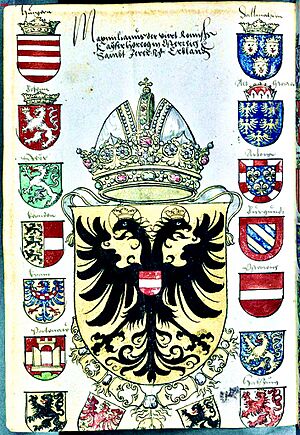Great Officers of State facts for kids
Government in the Middle Ages was often run by people close to the king. These people were his friends and helpers, who later became known as the royal household. From this group, important government jobs were created.
At first, these officers did both household tasks (like managing the king's home) and government duties. Over time, some jobs split into two: one for the state and one for the household. Some old jobs were replaced by new ones, or their duties were taken over by other officers. Many of these important jobs became hereditary, meaning they were passed down through families. This often meant the people holding these titles didn't actually do the work anymore; their roles became more about tradition.
Especially in kingdoms founded by the Normans, these jobs had similar features. In the United Kingdom, the Great Officers of State are traditional ministers of the Crown. They either inherit their positions or are chosen to perform mostly ceremonial duties. Some also work as part of the government. There are separate Great Officers for England and for Scotland. In the past, there were also officers for Ireland. The same system existed in the Kingdoms of Sicily and Naples. Many of these Great Officer roles became mostly ceremonial because they were once so powerful that the king had to take back their authority, or their powers simply faded away.
Contents
England's Royal Officers
Just like Scotland, England also has its own set of Great Officers of State. These roles have a long history and many are now mostly ceremonial, meaning they are important for tradition but don't involve daily government work.
Important Roles in the Holy Roman Empire
In the Holy Roman Empire, powerful princes known as "Princes Elector" held special "High Offices of the Empire" (called Reichserzämter in German). These were like modern Cabinet positions and made them members of the Emperor's ceremonial Imperial Household.
There were three spiritual electors, who were Arch-Chancellors (Erzkanzler):
- The Archbishop of Mainz was the Arch-Chancellor of Germany.
- The Archbishop of Cologne was the Arch-Chancellor of Italy.
- The Archbishop of Trier was the Arch-Chancellor of Burgundy.
The other six electors were secular (non-religious) princes. They were given special additions to their coats of arms to show their important roles in the Imperial Household. These additions were either small badges, like for the Arch-Steward, Treasurer, and Chamberlain, or placed on the right side of the shield, like for the Arch-Marshal and Arch-Bannerbearer. For the Arch-Cupbearer, the symbol was part of the shield itself, held by the Bohemian lion.
Here are some of the main High Offices and who held them:
- Arch-Cupbearer (Erzmundschenk): This role was held by the King of Bohemia. They were in charge of the emperor's drinks.
- Arch-Steward (Erztruchseß): This important role was held by the Elector Palatine for a long time, and later by the Elector of Bavaria. The Steward was responsible for the emperor's food and household management.
- Arch-Treasurer (Erzschatzmeister): The Elector Palatine and later the Elector of Hanover held this position. The Treasurer managed the emperor's money.
- Arch-Marshal (Erzmarschall): This role belonged to the Elector of Saxony. The Marshal was in charge of the army and ceremonies.
- Arch-Chamberlain (Erzkämmerer): The Elector of Brandenburg held this office. The Chamberlain managed the emperor's personal chambers and household staff.
- Arch-Bannerbearer (Erzbannerträger): This was held by the Elector of Württemberg. The Bannerbearer carried the imperial standard (flag) in battle or ceremonies.
Scotland's Great Officers
Scotland also had its own Great Officers of State, who played important roles in the government and royal household before the union with England in 1707. Many of these roles have since changed or become ceremonial.
Here are some of the Scottish Great Officers:
- Lord High Chancellor: This was the most important legal officer. After 1707, this role merged with the English Lord High Chancellor.
- Lord High Treasurer: This officer managed the country's money. This role also merged with the English Treasurer after 1707.
- Lord Keeper of the Privy Seal: This person was in charge of the Privy Seal, a special stamp used for important documents. This role has been vacant (empty) since 1921.
- Secretary of State: This officer handled important government communications. The office was abolished (ended) in 1709.
- Lord Clerk Register: This person is still active today! They are in charge of Scotland's public records.
- Lord Advocate: This is Scotland's chief legal officer and prosecutor. This role is still very active today.
- Lord Justice Clerk: This is the second highest judge in Scotland. This role is also still active today.
Some other roles, like the Comptroller of Scotland and Master of Requests, were merged into other offices or abolished over time.
See also
- Great Offices of State
- Royal Households of the United Kingdom
- Kingdom of England
- Great Officers of the Crown of France
- Kingdom of France
- Holy Roman Empire
- Great Officers of State of Ireland
- Kingdom of Ireland
- Kingdom of Poland
- Kingdom of Scotland
- Kingdom of Sicily
- Great Officers of Sweden
- Kingdom of Sweden
 | Selma Burke |
 | Pauline Powell Burns |
 | Frederick J. Brown |
 | Robert Blackburn |




